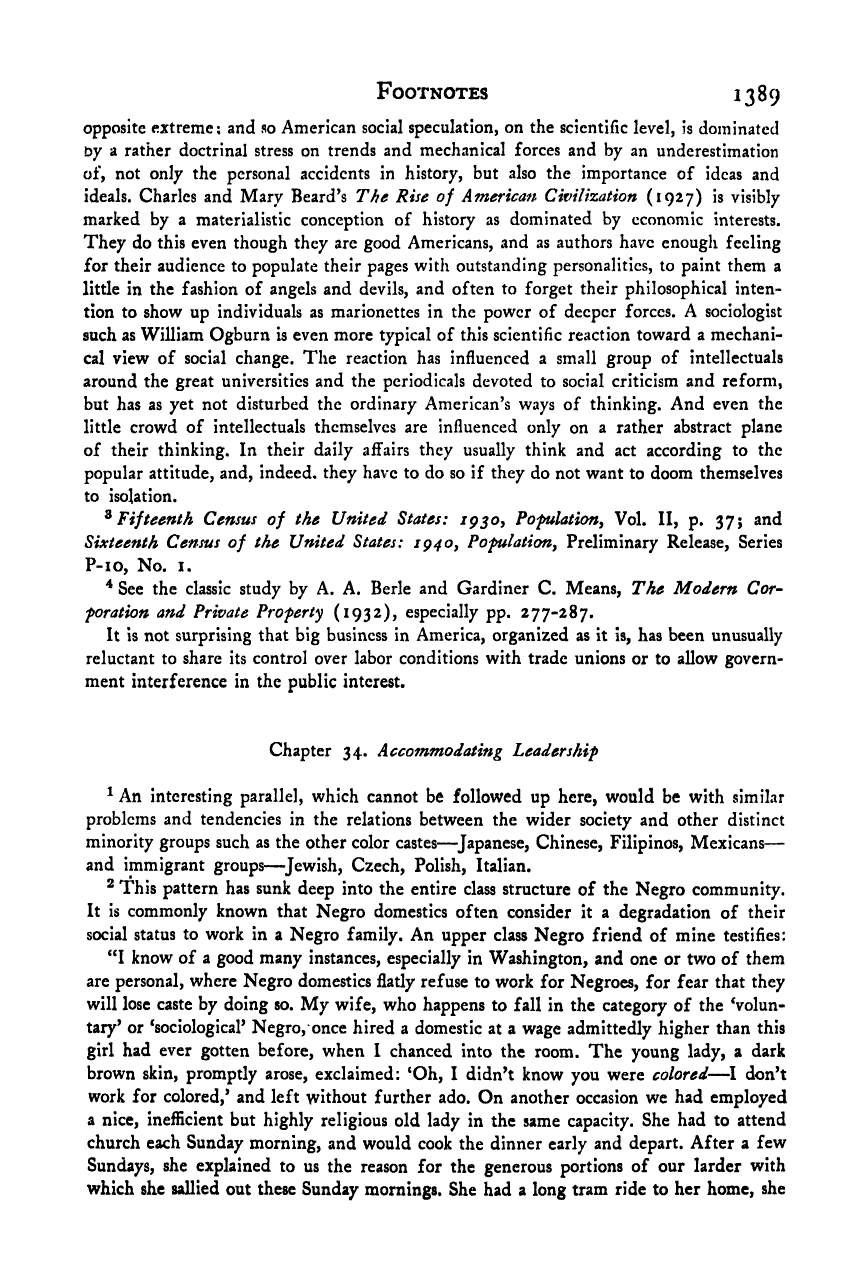Note: Gunnar Myrdal died in 1987, less than 70 years ago. Therefore, this work is protected by copyright, restricting your legal rights to reproduce it. However, you are welcome to view it on screen, as you do now. Read more about copyright.
Full resolution (TIFF) - On this page / på denna sida - Footnotes - Chapter 33 - Chapter 34

<< prev. page << föreg. sida << >> nästa sida >> next page >>
Below is the raw OCR text
from the above scanned image.
Do you see an error? Proofread the page now!
Här nedan syns maskintolkade texten från faksimilbilden ovan.
Ser du något fel? Korrekturläs sidan nu!
This page has never been proofread. / Denna sida har aldrig korrekturlästs.
Footnotes 1389
opposite extreme; and so American social speculation, on the scientific level, is dominated
Dy a rather doctrinal stress on trends and mechanical forces and by an underestimation
of, not only the personal accidents in history, but also the importance of ideas and
ideals. Charles and Mary Beard’s The Rise of American Civilization (1927) is visibly
marked by a materialistic conception of history as dominated by economic interests.
They do this even though they are good Americans, and as authors have enough feeling
for their audience to populate their pages with outstanding personalities, to paint them a
little in the fashion of angels and devils, and often to forget their philosophical inten-
tion to show up individuals as marionettes in the power of deeper forces. A sociologist
such as William Ogburn is even more typical of this scientific reaction toward a mechani-
cal view of social change. The reaction has influenced a small group of intellectuals
around the great universities and the periodicals devoted to social criticism and reform,
but has as yet not disturbed the ordinary American’s ways of thinking. And even the
little crowd of intellectuals themselves are influenced only on a rather abstract plane
of their thinking. In their daily affairs they usually think and act according to the
popular attitude, and, indeed, they have to do so if they do not want to doom themselves
to isolation.
^Fifteenth Census of the United States: ipjo, Popdationy Vol. II, p. 375 and
Sixteenth Census of the United States: ig40y Pofulationy Preliminary Release, Series
P-io, No. I.
^
See the classic study by A. A. Berle and Gardiner C. Means, The Modern Cor-
foration and Private Proferty (1932), especially pp. 277-287,
It is not surprising that big business in America, organized as it is, has been unusually
reluctant to share its control over labor conditions with trade unions or to allow govern-
ment interference in the public interest.
Chapter 34. Accommodating Leadership
^
An interesting parallel, which cannot be followed up here, would be with similar
problems and tendencies in the relations between the wider society and other distinct
minority groups such as the other color castes—^Japanese, Chinese, Filipinos, Mexicans
—
and immigrant groups—^Jewish, Czech, Polish, Italian,
^ This pattern has sunk deep into the entire class structure of the Negro community.
It is commonly known that Negro domestics often consider it a degradation of their
social status to work in a Negro family. An upper class Negro friend of mine testifies:
“I know of a good many instances, especially in Washington, and one or two of them
are personal, where Negro domestics flatly refuse to work for Negroes, for fear that they
will lose caste by doing so. My wife, who happens to fall in the category of the ‘volun-
tary’ or ‘sociological’ Negro, once hired a domestic at a wage admittedly higher than this
girl had ever gotten before, when 1 chanced into the room. The young lady, a dark
brown skin, promptly arose, exclaimed; ‘Oh, I didn’t know you were colored—I don’t
work for colored,’ and left without further ado. On another occasion we had employed
a nice, inefficient but highly religious old lady in the same capacity. She had to attend
church each Sunday morning, and would cook the dinner early and depart. After a few
Sundays, she explained to us the reason for the generous portions of our larder with
which she sallied out these Sunday mornings. She had a long tram ride to her home, she
<< prev. page << föreg. sida << >> nästa sida >> next page >>